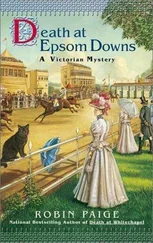Robin Paige - Death at Blenheim Palace
Здесь есть возможность читать онлайн «Robin Paige - Death at Blenheim Palace» весь текст электронной книги совершенно бесплатно (целиком полную версию без сокращений). В некоторых случаях можно слушать аудио, скачать через торрент в формате fb2 и присутствует краткое содержание. Жанр: Классический детектив, на английском языке. Описание произведения, (предисловие) а так же отзывы посетителей доступны на портале библиотеки ЛибКат.
- Название:Death at Blenheim Palace
- Автор:
- Жанр:
- Год:неизвестен
- ISBN:нет данных
- Рейтинг книги:4 / 5. Голосов: 1
-
Избранное:Добавить в избранное
- Отзывы:
-
Ваша оценка:
- 80
- 1
- 2
- 3
- 4
- 5
Death at Blenheim Palace: краткое содержание, описание и аннотация
Предлагаем к чтению аннотацию, описание, краткое содержание или предисловие (зависит от того, что написал сам автор книги «Death at Blenheim Palace»). Если вы не нашли необходимую информацию о книге — напишите в комментариях, мы постараемся отыскать её.
Death at Blenheim Palace — читать онлайн бесплатно полную книгу (весь текст) целиком
Ниже представлен текст книги, разбитый по страницам. Система сохранения места последней прочитанной страницы, позволяет с удобством читать онлайн бесплатно книгу «Death at Blenheim Palace», без необходимости каждый раз заново искать на чём Вы остановились. Поставьте закладку, и сможете в любой момент перейти на страницу, на которой закончили чтение.
Интервал:
Закладка:
And that would be a great pity. Consuelo had admirably performed the first duty of a duchess, having given the Duke not just one son, but two. She was a conscientious mother and a superb hostess as well, and Blenheim would not be the same without her. While Winston didn’t like to think of the matter in terms of money, one had to be realistic. If Consuelo left, she took with her nearly a quarter of a million dollars a year. The Duke did not seem to realize it, but losing his wife would be a terrible blow, both to the family pride and to the family purse.
Winston and his cousin had always enjoyed a cordial friendship, in part, perhaps, because they rarely spoke of personal feelings. Politics, the Royals, family history, the latest novels of Henry James, the plays of Ibsen and Stevens, Marconi’s triumphs, the reforms of the Webbs and the Fabians-the two men had a world of things to discuss, but personal relationships were never on the table. Gladys, however, was becoming too serious a threat to simply let the business slide. Winston felt he must say something.
He cleared his throat. “My dear Sunny,” he said awkwardly, “I wonder if we might have a confidential word-man to man, I mean.”
The Duke dropped his eyes and ducked his head as he always did when he felt uncomfortable. “About what?”
Winston moved a book a quarter of an inch to the right. “About Miss Deacon.”
There was a long silence. The phalanx of plaster dukes, like a Greek chorus, peered down, dumb and empty-eyed, at two very different descendents of John Churchill. Winston was a physical man, robustly, energetically self-assertive, while Sunny, pallid and polite, maintained an aloof disdain. Winston’s father had left him nothing but debts, and he had to depend on his pen and his wits to fill his pockets. Sunny’s father had left him an estate and a title; he had traded the title for his wife’s American fortune, and now his pockets were full. Winston lived a restless, hard-fought life in the world at large; nothing came easily to him, nothing seemed guaranteed, whether it was besting a political opponent or conquering a childhood stammer. Sunny, on the other hand, confined himself to Blenheim, where everything came easily to him, where everything was guaranteed-except happiness.
But while they might be very different, what bound these two Churchills together was their passionate love of Blenheim and their common determination to once again raise the Marlborough standard to its previous heights of respect and admiration. That was why Winston was smoothing over the rough places in his father’s life, and why the Duke was landscaping the palace. And that was why Sunny must be made to understand, Winston thought, that Gladys Deacon threatened all of them-not just Consuelo, or Sunny, but the entire family.
Sunny, however, was not to be confronted. He raised his hooded eyes and met Winston’s challenging look with the famous Marlborough blank stare.
“I believe I heard the gong for tea,” he said. “I think we had better change. We do not want to be late.”
CHAPTER SEVEN
A plague upon it when thieves cannot be true to one another.
King Henry IV, Part I, William ShakespeareIt was early Wednesday evening as Alfred hurried through the small gate beside the River Glyme where it flowed under the Park wall. In fact, the hour was so early that Bulls-eye might not yet have put in an appearance at the pub. But Alfred had no choice-it was now or not at all. And by this time, he was feeling desperate.
Alfred’s destination, the pub called the Black Prince, was located just across Manor Road, a much-traveled coach-road which ran from London to Oxford and Woodstock, then northward to Chipping Norton and Stratford-upon-Avon. Alfred darted across the road, busy with the usual clattering traffic of carts and drays, and pushed through the crowd of hooting children and barking dogs which was trailing a noisy motorcar. He paused at the door of the Prince, pulling down his cap to hide his powdered hair and allowing his eyes to grow accustomed to the dimness.
The Prince was certainly not one of Woodstock’s poshest pubs. The ceiling was low and smoke-stained, shoals of filthy sawdust drifted across the stone floor, and the company was rowdy and quarrelsome. But the place was dark as a pit, even in broad daylight, and the din of the crowd blanketed private conversation, which made it a right-enough place to meet somebody if you didn’t want to be noticed or overheard. Over the weeks he’d been in service at Blenheim, Alfred had spent a leisurely evening or two here, in the company of one or another of the other footmen.
But tonight Alfred was in a hurry. It was his half-day off, officially, but Manning had hurt his hand and Alfred was made to serve at tea. He would have to serve at dinner, too, which meant that he had to get this business done and get back before old Stevens missed him. The butler wasn’t hard on the footmen, but he was particular about seeing that everyone kept to the duty roster. With relief, he spotted Bulls-eye at his usual table in a far dark corner, hunched over a mug and a pitcher of ale. He pushed his way through the crowd toward him.
At the table, Bulls-eye lifted his head and regarded Alfred with a frown. “Wot’re ye doin’ ’ere?” he demanded, over a roar of laughter at the bar. If he was surprised, he didn’t betray it, only looked annoyed. “There’s a rule ’bout meetings, y’know. Less we’re seen together, the better fer all concerned.”
“I had to come,” Alfred said breathlessly. “Something’s gone wrong.”
“Gone wrong, ’as it?” Bulls-eye kicked out a chair and Alfred seated himself. “Wot’s gone wrong?”
At the bar, there was a loud clink of glasses and another roar of laughter. “It’s the girl,” Alfred said, trying to be offhand. He cast an uneasy glance over his shoulder, hoping that none of the other servants were here. He couldn’t be charged with doing anything wrong, of course. It was his half-day off, even if he’d had to stand in for Manning. He had every bit as much right to be here as the next man. Still and all, Bulls-eye’s remark had reminded him that this wasn’t an ordinary meeting, and he felt apprehensive.
“The girl?” Bulls-eye scowled. “She’s keeping up ’er end, ain’t she?” He paused, seemed to collect himself, and picked up the pitcher. “If ye want a glass, get one from the bar.”
Alfred shook his head. He couldn’t serve at dinner smelling like a brewery. “I don’t know whether she is or not,” he said. “I haven’t seen her since Friday, and that’s a fact.”
“Since Friday?” Bulls-eye’s forehead puckered. He was a short man, stout and thick-chested, with heavy shoulders, beefy hands, and thick, bushy black hair that stuck out in all directions. “An’ today’s Wednesday. I shouldn’t think ye’d be likely t’see ’er all that much.” He frowned at Alfred. “Doan’t work in the same places, d’ye? Doan’t take yer meals together, d’ye?” He paused, lowering his brows. “Anybody at the house askin’ questions ’bout ’er?”
“Questions?” Alfred repeated uneasily. “Not that I’ve heard.”
Bulls-eye’s comments were to the point, however, because under ordinary circumstances and in most of the big houses, a footman would cross a housemaid’s path only occasionally. At Blenheim, the housemaids ate with the lower servants in the servants’ hall, while the six footmen took their meals together in the butler’s pantry. During the working day, the footmen waited on the family and guests in the drawing rooms and Saloon and rarely found their way into the private quarters, while the housemaids mostly worked in the upstairs bedrooms, with only short stints in rota for dusting and carpets downstairs.
Читать дальшеИнтервал:
Закладка:
Похожие книги на «Death at Blenheim Palace»
Представляем Вашему вниманию похожие книги на «Death at Blenheim Palace» списком для выбора. Мы отобрали схожую по названию и смыслу литературу в надежде предоставить читателям больше вариантов отыскать новые, интересные, ещё непрочитанные произведения.
Обсуждение, отзывы о книге «Death at Blenheim Palace» и просто собственные мнения читателей. Оставьте ваши комментарии, напишите, что Вы думаете о произведении, его смысле или главных героях. Укажите что конкретно понравилось, а что нет, и почему Вы так считаете.











